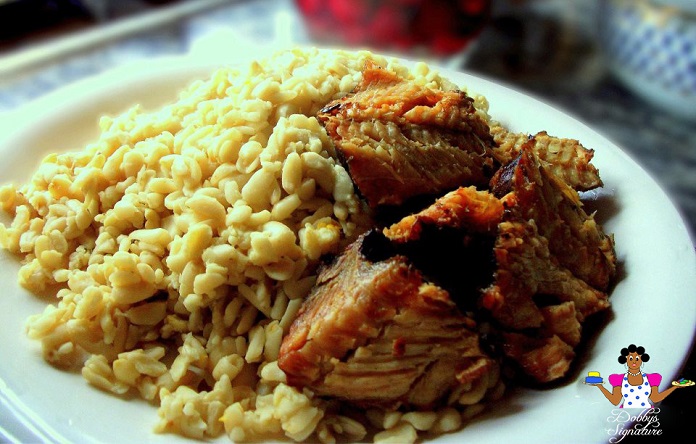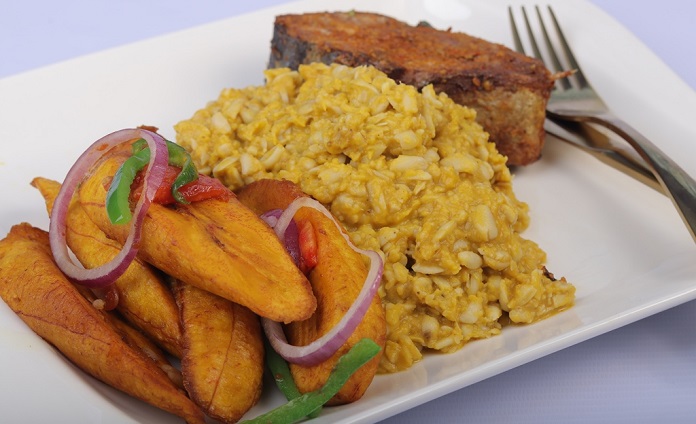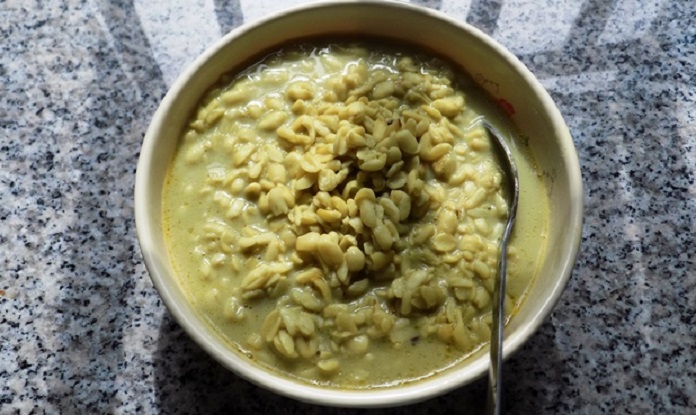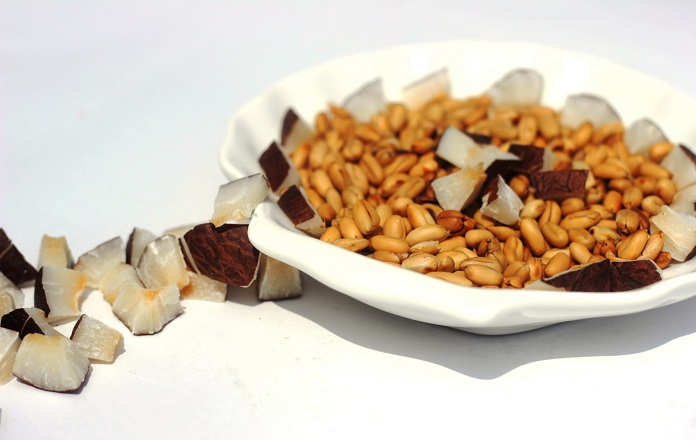Ukwa, which goes with the botanical name Treculia Africana is also known in English as African breadfruit. The meal is a highly nutritious delicacy eaten by most people in the Southeastern region of Nigeria. It is a special meal made into porridge or fried and eaten with palm kernel nut or coconut. The meal, which contains essential vitamins and minerals, is also rich in protein, carbohydrate, fiber, fat, oil.
Though the meal is most common to the Igbo tribe, it also has a name from the other tribes in Nigeria. It is called Afon in Yoruba, Ize in Benin, Jekri Sobo in Ijaw, and Ediang in Efik. Asides from being cooked, you can also make it into snacks, cakes, drinks, and many more.
The Origin Of Ukwa
Ukwa has been in existence since B.C and has been serving as a meal mostly to the Igbos. The seeds are similar to the breadfruit found and eaten in the Caribbean and South Pacific, though a little different, which brought about the English name breadfruit. The fruit grows to an approximate size of a large watermelon and they are not plucked from the tree; instead, they are allowed to fall after ripening.
The fruits are kept or covered with a jute bag to rotten to make the extraction of the seeds easier. It is then smashed on a rock or broken into pieces, after which they are washed to remove the slimy substance. After the cleaning process, it is then dried to make it easier to remove the husk. Finally, the seeds are kneaded with bottles or rollers to easily remove the husk before the final cleaning. It is dried under the sun to remove the moist before storage to avoid spoilage.
Ukwa is prepared in so many ways by the Igbos after the extraction of the seed. Some eat it plain or make it into porridge, while some prefer eating it fried with palm kernel or coconut. In most parts of the Igbo land, the food is served mainly at big events because of its rich content. The food to date has remained one the best delicacies in the tribe that portrays much value to anyone it is served to.
How To Prepare Ukwa
Ukwa is a well-eaten meal that can be prepared and eaten in many ways. It can be served as plain ukwa without palm oil or come in as porridge. Whichever way the meal is served, it still gives its great taste. Cooking ukwa is quite time-consuming and is often cooked with a catalyst to hasten the softness. For example, one can add ‘Ngu’ (gotten from burnt palm fonds) or ‘akanwu’ (potash) to hasten the cooking.
How Long Does It Take to Cook Ukwa?
The meal requires enough ingredients to make it look and taste appetizing. To prepare about 500g of ukwa 1 hour 30 minutes would be needed to get the meal ready.
Below are two different recipes for the African delicacy:
First Recipe
To prepare a sumptuous ukwa porridge, make sure the following ingredients are made available:
- 600g of ukwa (freshly peeled or dried ukwa)
- Boullion cube
- Sizeable edible potash or ngu
- Two medium stockfish or dry fish
- One large onion
- Grounded crayfish or whole crayfish
- Salt to taste
- Dry or fresh pepper
- Freshly washed bitter leaf
- White yam (optional)
- Corn (optional)
- Plantain (optional)
Steps To Take In Preparing Ukwa Porridge
- Separate the stones and husks from ukwa and soak overnight to make it tender if dried. If you are using fresh ukwa, there is no need for soaking overnight
- Before preparing the meal, soak the stockfish or dry fish in warm water, remove the bones, and wash thoroughly to get rid of sand
- Wash the soaked ukwa thoroughly to remove the remaining sand and husk
- Grind the amount of pepper to be used
- Soak the potash or ngu in water, sieve the water into a bowl, and remove the residue.
- Wash the bitter leaf and keep
- Cook the corn in a separate pot and keep if you wish to make use of corn
Methods of Cooking
- Pour the washed ukwa into a pot
- Add enough water to it to cover the ukwa. Ensure that the water level should be about an inch above the ukwa
- Put the water gotten from edible potash or ngu
- Add the stock fish or dry fish, cover the pot till the ukwa becomes tender. (to check for tenderness, scoop up a spoon of ukwa and press)
- Pour in red oil to your taste
- Add the bouillon cube, crayfish (grounded or whole), pepper, and salt to taste
- Add the already cooked corn (if you are making use of corn)
- Stir the food, cover, and cook on low heat for about 5 minutes till the red oil changes color to yellow
- Add the bitter leaf and stir
- Cover the pot, and use low heat cooking pressure till the bitter leaf wilts
- Serve with palm wine or any drink of your choice
If you wish to eat the ukwa plain, you can skip adding palm oil to the food while cooking.
Second Recipe
Ukwa is also cooked with the following ingredients and methods:
- 600g of ukwa (freshly peeled or dried ukwa)
- Ogiri
- Boullion cube
- Sizeable edible potash or ngu
- Two medium stockfish, dry fish, or smoked fish
- Meat or fish (optional)
- One large onion
- One handful of sliced ukpaka/ugba (oil bean)
- Grounded crayfish or whole crayfish
- Salt to taste
- Scotch bonnet, yellow, and green pepper
- Freshly washed bitter leaf
- Corn
- Plantain
Methods Of Cooking
- Pour the washed ukwa into a pot
- Add the potash or ngu water to the ukwa
- You can add a little meat stock (if you are using meat)
- Add enough water to cover the ukwa and cook for about 45 minutes
- Pour in the stock or dry fish and cook for 15 minutes
- Pour in the corn and cook for 10 minutes
- Put your ogiri (sesame seed)
- Set a dry pan or pot on fire, add palm oil, and allow to heat for some seconds
- Add your onion crayfish and stir for about 1-2 minutes
- Add the palm oil and the other contents into the pot for cooking ukwa, stir and cover the pot for 4 minutes
- Add the steamed meat
- Add the bouillon cube
- Add the required salt to taste
- You can add your smoked fish if there are any
- Add the bitter leaf and cover till it wilts
- Serve your sumptuous meal with or without any drink
Note that if you are using fresh fish, it should be cooked separately and served beside the meal. The plantain should be fried and served beside the dish. The yam should also be boiled and served beside the plate. The point is that you don’t need to cook the side dishes together with the ukwa unless you wish to. Baking soda can be used as an alternative if no edible potash or ngu is available.
What Are The Health Benefits Of Ukwa?
Ukwa contains many essential vitamins and minerals, protein, carbohydrates, fiber, fat, oil that help the body system. The essential constituents that this African delicacy comes with include:
1. Vitamins
- Niacin
- Pyridoxine
- Vitamin A, C, E, K
- Folic acid (folate)
- Thiamin
2. Electrolytes
- Sodium
- Potassium
3. Minerals
- Zinc
- Magnesium
- Manganese
- Phosphorous
- Iron
- Copper
- Calcium
- Selenium
4. Phyto-nutrients
- Beta-carotene
- Lutein-zeaxanthin
- Beta-crypto-xanthin
Every 100g or 3.5oz of ukwa constitutes the following:
- 10% Unsaturated fat (beneficial fat)
- 12-15% Protein
- 25% Carbohydrates
- 2% Fiber
- 240 KCal
The health benefits of ukwa include:
It Helps In Building Energy
The African breadfruit contains unsaturated fat, protein, carbohydrates, and fiber essential for energy building. The meal serves as one of the best pre or post-workout meals for sports lovers.
Ukwa Helps In Digestion
Ukwa is rich in fiber which aids in the proper digestion of food. In addition, fiber helps in detoxifying the intestine to ensure good bowel movement. Therefore, taking ukwa regularly helps eradicate digestion-related issues like ulcers, constipation, gastritis, stomach bloating, heartburn, etc.
It Helps In Boosting The Cardiovascular System
Ukwa is a good source of potassium and fiber, making it a heart-friendly meal. The potassium content in ukwa helps eradicate excess sodium content, thereby maintaining good blood pressure. In addition, the fiber content in the seed ensures that there is a proper flow of blood by preventing blood clots from accumulating in the artery.
In addition to the value of fiber in the cardiovascular system, it decreases the amount of cholesterol in the body by preventing absorption in the gut. It also helps reduce LDL (low-density lipoprotein, also known as bad cholesterol) and increases the body’s HDL (high-density lipoprotein, also called good cholesterol). It decreases the level of triglyceride in the blood, which is one of the leading causes of heart attacks.
It Aids In Weight Loss
Ukwa is a perfect meal for those who are overweight. The fiber content in the food helps regulate food cravings ( help you reduce the intake of excess calories). In addition, it reduces the level of fat and cellulite in the body.
Ukwa Enhances Proper Brain Development
Ukwa is rich in neurological improvement properties, including omega 3 and 6 fatty acids, folate, vitamin B6, potassium, magnesium, and many more. The folate content helps in reducing the risk of brain dysfunction. The potassium content ensures proper blood flow to the brain, thereby increasing optimal neural activities, concentration, and many more. Vitamin B6 and magnesium decrease the risk of depression, insomnia, etc., and increase emotional stability.
Omega-6 and omega-3 fatty acids help in developing the mind and body properly. The omega-3 fatty acid is part of the body’s most essential nutrients because of its role in brain development and other crucial functions, including heart health and an anti-inflammatory agent.
It Makes The Skin Glow
The high level of Vitamin C in breadfruit aids in the production of collagen, a protein that holds the body together and makes the skin glow. Collagen makes up about 30% of the body and is found in joints and bones. It is also an anti-aging formula and prevents wrinkles. Ukwa is also effective in fighting against skin-related infections, inflammations, and many more.
The Food Helps In Strengthening The Bones
The fruit contains essential minerals such as calcium, niacin, potassium riboflavin, etc. that help in the formation of strong bones. Potassium as a content in the food helps in calcium conservation, fluid balance, skeletal movement, smoothing muscles contractions. Metabolism and general growth are enhanced by the zinc and magnesium components of ukwa. Therefore, a steady intake of it helps reduce the risk of bone-related deficiencies.
Ukwa Is A Good Immune Booster
Ukwa has a good immune-boosting capacity due to its high Vitamin C constituent. This Vitamin C content enhances the immune system to fight against infections, diseases, and illnesses. It also helps fight against carcinogenic radicals in the body, thereby strengthening the immune system.
It Serves As A Good Food For Diabetic Patients
Though diabetes is a chronic disease related to the sugar levels in the blood, it can still be regulated. With the help of some sugar-regulating meals like breadfruit, the illness can be managed. In addition, the fiber content in ukwa helps regulate the absorption of excessive glucose intake from carbohydrates.
It Aids In Fetal Development
Breadfruit contains a good amount of fiber, carbohydrates, omega 3, and 6 fatty acids. These nutrients make breadfruit excellent for pregnant women and the developing fetus. Omega 3 and 6 in breadfruit play a significant role in ensuring healthy brain development in unborn children.
This fruit’s high carbohydrate and calorie count provide pregnant mothers the energy they need during pregnancy. In addition, its high fiber content supports healthy cholesterol levels and lowers the risk of gestational diabetes.
Ukwa Ensures The Growth Of Healthy Hair
Breadfruit contains moderate amounts of iron, which improves blood circulation and stimulates scalp hair growth. In addition, the omega 3 and 6 fatty acids in ukwa oil help prevent breakage and promote healthy hair. The fatty acids also regulate sebum production in the scalp, which reduces dandruff and the itchiness that comes from a dry scalp. It also prevents scalp inflammation and cell death by preventing hair loss and improving brain health.



